Rails: Table Filtering & Sorting (Article 1 of 2)
Article 1 of 2: Easy Dynamic Table Sorting and Filtering with minimal JavaScript
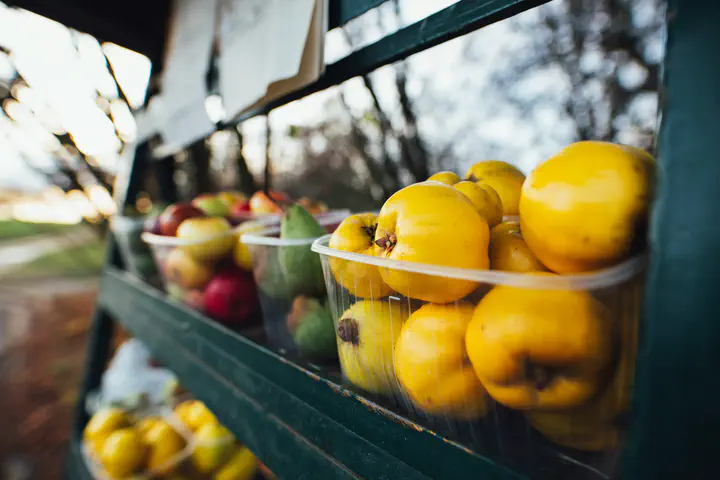
I recently learned that Rails 8 (actually 7.1+) has delightful features that make it easy to render dynamic tables without (or minimal) JavaScript and efficient network traffic. This is an exploration of using these new features. This article is an extension of: https://www.colby.so/posts/turbo-8-refresh-sorting
The cool thing is that morph updates without a full page reload - so its fast! and very easy to setup.
This article will go further and build sorting, filtering, and dropdown matching that all work together.
Aticle 1 of 2: Modern Rails: Table Filtering & Sorting Article 2 of 2: Modern Rails: Table Selection Form
The code for this article and the commits can be found at: https://github.com/btihen-dev/rails_table_filtering_sorting
Basic Rails App Setup
Create the App
I am a bit more comfortable using esbuild instead of import-maps, but feel free to use either.
NOTE: when using esbuild be sure to use bin/dev to start rails (or build your own integration with JS).
Create a new rails app:
# install the latest ruby
rbenv install 3.4.2
# install the latest rails
gem install rails
# create the app
rails new advanced_tables -T -j esbuild -d postgresql --css=bootstrap
# change to the new app
cd advanced_tables
In my setup (using postgres within Docker), I need to change the default config by adding host: localhost to config/database.yml, i.e.:
# config/database.yml
default: &default
adapter: postgresql
encoding: unicode
host: localhost
port: 5432
Now I can create the database and start rails:
# create the database
bin/rails db:create
# start rails
bin/dev
now if you open http://localhost:3000 you should see the default rails page.
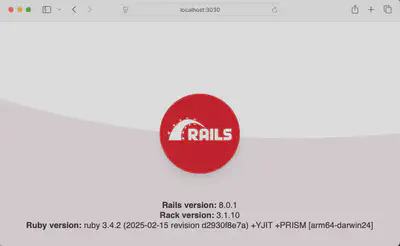
PS - I use bin/dev -p 3039 to avoid conflicts with my other rails apps.
Assuming that works - commit:
git add .
git commit -m "initial commit"
Create Models
We need some models to work with.
Build the models
bin/rails g scaffold Species species_name
bin/rails g scaffold Character nick_name first_name \
last_name given_name gender species:references
bin/rails g scaffold Company company_name
bin/rails g scaffold Job role company:references
bin/rails g model CharacterJob start_date:date end_date:date \
character:references job:references
Update/Tidy Models
Character
# app/models/character.rb
class Character < ApplicationRecord
belongs_to :species
has_many :character_jobs, dependent: :destroy
has_many :jobs, through: :character_jobs
has_many :companies, through: :jobs
validates :first_name,
uniqueness: {
scope: :last_name,
message: "first_name and last_name already exists"
}
validates :first_name, presence: true
validates :last_name, presence: true
validates :species, presence: true
validates :gender, presence: true
validates :gender, inclusion: { in: %w[male female] }
normalizes :first_name, :nick_name, :last_name, :given_name,
with: ->(value) { value.strip }
end
CharacterJob
# app/models/character_job.rb
class CharacterJob < ApplicationRecord
belongs_to :character
belongs_to :job
has_one :company, through: :job
validates :job, presence: true
validates :character, presence: true
validates :start_date, presence: true
validates :character,
uniqueness: {
scope: [ :job, :start_date ],
message: "character and job with start_date already exists"
}
end
Company
# app/models/company.rb
class Company < ApplicationRecord
has_many :jobs, dependent: :destroy
has_many :character_jobs, through: :jobs
has_many :characters, through: :character_jobs
validates :company_name, presence: true
validates :company_name, uniqueness: true
normalizes :company_name, with: ->(value) { value.strip }
end
Job
# app/models/job.rb
class Job < ApplicationRecord
belongs_to :company
has_many :character_jobs, dependent: :destroy
has_many :people, through: :character_jobs
validates :company, presence: true
validates :role, presence: true
validates :role,
uniqueness: {
scope: :company_id,
message: "role and company already exists"
}
normalizes :role, :title, :company,
with: ->(value) { value.strip }
end
Species
# app/models/species.rb
class Species < ApplicationRecord
has_many :characters, dependent: :destroy
validates :species_name, presence: true
validates :species_name, uniqueness: true
normalizes :species_name, with: ->(value) { value.strip }
end
Root Route
Lets make the character index page our home (root) page by adding root "characters#index" to the end of our routes:
#
Rails.application.routes.draw do
resources :jobs
resources :companies
resources :characters
resources :species
get "up" => "rails/health#show", as: :rails_health_check
# Defines the root path route ("/")
root "characters#index"
end
Seed Data
# copy https://github.com/btihen-dev/rails_advanced_tables/blob/main/db/seeds.rb in db/seeds.rb
bin/rails db:migrate
bin/rails db:seed
Check your Work
Start Rails: bin/dev
now when you open http://localhost:3000 you should see an ugly list of characters.
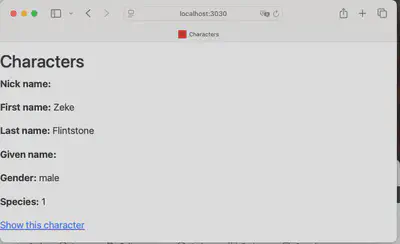
Assuming that works - commit:
git add .
git commit -m "add models and seed data"
Build the Basic Table
Let’s change app/views/characters/index.html.erb into a table using:
# app/views/characters/index.html.erb
<p style="color: green"><%= notice %></p>
<% content_for :title, "Characters" %>
<h1>Characters</h1>
<div id="characters" class="container text-center">
<table class="table table-striped table-hover">
<thead class="sticky-top">
<tr class="table-primary">
<th scope="col" class="align-top">ID</th>
<th scope="col" class="align-top">Last Name</th>
<th scope="col" class="align-top">First Name</th>
<th scope="col" class="align-top">Gender</th>
<th scope="col" class="align-top">Species</th>
<th scope="col" class="align-top">Company</th>
</tr>
</thead>
<tbody class="scrollable-table">
<% @characters.each do |character| %>
<tr id="<%= dom_id(character) %>">
<th scope="row"><%= link_to character.id, edit_character_path(character) %></th>
<td><%= character.last_name %></td>
<td><%= character.first_name %></td>
<td><%= character.gender %></td>
<td><%= character.species.species_name %></td>
<td class="text-start">
<% character.character_jobs.each do |character_job| %>
<div class="job-container mb-2">
<div class="company-row">
<div class="h6"><b><%= character_job.job.company.company_name %></b></div>
</div>
<div class="job-details-row">
<span style="font-weight: 600;">- <%= character_job.job.role %></span>
<span>
<em>
(from: <%= character_job.start_date.strftime("%e %b '%y") %>
to: <%= character_job.end_date&.strftime("%e %b '%y") || 'present' %>)
</em>
</span>
</div>
</div>
<% end %>
</td>
</tr>
<% end %>
</tbody>
</table>
</div>
<%= link_to "New character", new_character_path, class: "mt-5 sticky-top btn btn-primary" %>
Ensure your rails is running with bin/dev and open your browser and go to http://localhost:3000 be sure you see a list of characters like:
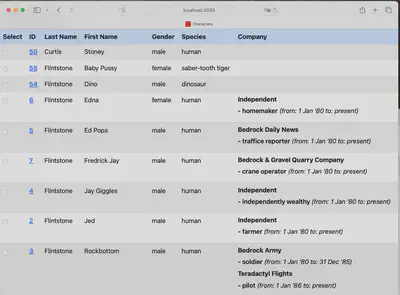
Unfortunately now we have an N+1 query problem - when we look at the query log summary we see:
...
15:27:32 web.1 | Completed 200 OK in 286ms (Views: 96.4ms | ActiveRecord: 156.7ms (167 queries, 69 cached) | GC: 1.1ms)
167 queries is way to many! Its because we are loading all the character jobs for each character and @characters = Character.all is not preloading the character jobs.
Let’s fix the N+1 query by preloading the character jobs in app/controllers/characters_controller.rb with:
# app/controllers/characters_controller.rb
def index
@characters =
Character
.includes(:species)
.includes(character_jobs: { job: :company })
.order(:last_name, :first_name)
end
Now we can see we can do the query with only 5 queries:
15:38:58 web.1 | Completed 200 OK in 53ms (Views: 13.3ms | ActiveRecord: 10.4ms (5 queries, 0 cached) | GC: 0.0ms)
...
Now let’s commit our work:
git add .
git commit -m "character table with efficient query"
Add Sortable Columns
We want to make the table sortable by clicking on the column headers. We will need arrows to indicate the sort direction we want to cycle through ascending and descending or no sort. The following code control the sorting arrows.
# app/helpers/characters_helper.rb
module CharactersHelper
def sort_link(column:)
direction = column == params[:column] ? future_direction : ''
display_arrow = sort_arrow_tag_for(column, direction)
link_to(
display_arrow.html_safe,
characters_path(column: column, direction: direction)
)
end
def future_direction
case params[:direction]
when '' then 'asc'
when 'asc' then 'desc'
else ''
end
end
def sort_arrow_tag_for(column, direction)
params[:column] == column ? sort_arrow(direction) : tag.i(class: "bi bi-arrow-down-up")
end
def sort_arrow(direction)
case direction
when 'asc' then tag.i(class: "bi bi-arrow-up")
when 'desc' then tag.i(class: "bi bi-arrow-down")
else tag.i(class: "bi bi-arrow-down-up")
end
end
end
Now let’s integrate the arrows into the headers in: app/views/people/index.html.erb
We will add the sort_link to the header in each column. With ID we need to use character.id as the column name to avoid confusion with the other id column we have included in our query. Similarly, we will use company.company_name for the company column.
# app/views/characters/index.html.erb
<p style="color: green"><%= notice %></p>
<% content_for :title, "Characters" %>
<h1>Characters</h1>
<div id="characters" class="container text-center">
<table class="table table-striped table-hover">
<thead class="sticky-top">
<tr class="table-primary">
<th scope="col" class="align-top">
ID <%= sort_link(column: "characters.id") %>
</th>
<th scope="col" class="align-top">
Last Name <%= sort_link(column: "last_name") %></th>
<th scope="col" class="align-top">
First Name <%= sort_link(column: "first_name") %>
</th>
<th scope="col" class="align-top">
Gender <%= sort_link(column: "gender") %>
</th>
<th scope="col" class="align-top">
Species <%= sort_link(column: "species.species_name") %>
</th>
<th scope="col" class="align-top">
Company <%= sort_link(column: "companies.company_name") %>
</th>
</tr>
</thead>
<tbody class="scrollable-table">
<% @characters.each do |character| %>
<tr id="<%= dom_id(character) %>">
<th scope="row"><%= link_to character.id, edit_character_path(character) %></th>
<td><%= character.last_name %></td>
<td><%= character.first_name %></td>
<td><%= character.gender %></td>
<td><%= character.species.species_name %></td>
<td class="text-start">
<% character.character_jobs.each do |character_job| %>
<div class="job-container mb-2">
<div class="company-row">
<div class="h6"><b><%= character_job.job.company.company_name %></b></div>
</div>
<div class="job-details-row">
<span style="font-weight: 600;">- <%= character_job.job.role %></span>
<span>
<em>
(from: <%= character_job.start_date.strftime("%e %b '%y") %>
to: <%= character_job.end_date&.strftime("%e %b '%y") || 'present' %>)
</em>
</span>
</div>
</div>
<% end %>
</td>
</tr>
<% end %>
</tbody>
</table>
</div>
<%= link_to "New character", new_character_path, class: "mt-5 sticky-top btn btn-primary" %>
To keep the controller simple we use: characters.id, species.species_name, and companies.company_name as the column names - which is consistent with the query sort name.
start rails with bin/dev and be sure we can toggle through the sort arrows in the header column.

Assuming this works (looks similar and the arrows rotate when clicked), then it’s time to update the controller to actually sort the list based on the column we clicked.
# app/controllers/characters_controller.rb
class CharactersController < ApplicationController
before_action :set_character, only: %i[ show edit update destroy ]
# GET /characters or /characters.json
def index
# query with sorting
column = params[:column]
direction = params[:direction]
# base query
query = Character
.includes(:species)
.includes(character_jobs: { job: :company })
# add sort if direction is given
query = if direction == 'none' || column.blank?
query.order('characters.id')
else
query.order("#{column} #{direction}")
end
# execute query
@characters = query.all
end
Test and be sure you can sort (ascending, descending or no sort) on each column in the table.
Assuning this works, let’s commit this.
git add .
git commit -m "table with dynamic sortable columns"
Scroll Location Preservation
Our sorting works well, but when we scroll down the page and then click a sort arrow, the page scrolls back to the top. Let’s fix this.
We will add morph-dom and scroll preservation to just our page where we need it. To do this we need to update the header with a header refresh using:
# app/views/layouts/application.html.erb
<head>
...
<% if content_for? :head %><%= yield :head %><% end %>
...
</head>
NOTE: if you want to add this to every template then do the following in your template (probably best to do only in new projects)
# app/views/layouts/application.html.erb
<head>
...
<!-- adds morph dom and scroll preservation to every page -->
<%# turbo_refreshes_with method: :morph, scroll: :preserve %>
<%# yield :head %>
...
</head>
Now we need to add morph dom and scroll preserve code to our page using: <%= turbo_refreshes_with method: :morph, scroll: :preserve %> so now our index page looks like:
# app/views/characters/index.html.erb
<%= turbo_refreshes_with method: :morph, scroll: :preserve %>
<p style="color: green"><%= notice %></p>
<% content_for :title, "Characters" %>
<h1>Characters</h1>
<div id="characters" class="container text-center">
...
Finally we need to add data: { turbo_action: 'replace' } to our sort_links to tell morph dom be used and preserve our scroll location. We need to modify our helper to look like:
# app/helpers/characters_helper.rb
module CharactersHelper
def sort_link(column:)
next_direction = column == params[:column] ? future_direction : 'asc'
display_arrow = params[:column] == column ? current_sort_arrow : tag.i(class: "bi bi-arrow-down-up")
link_to(
display_arrow.html_safe,
characters_path(column: column, direction: next_direction),
data: { turbo_action: 'replace' }
)
end
...
Now restart rails bin/dev and test.
Scroll down to the bottom of the page:
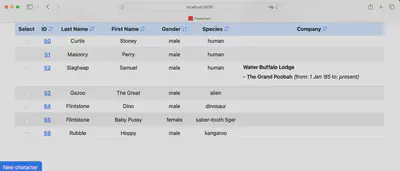
Now trigger a sort. We should remain at the bottom of the page:
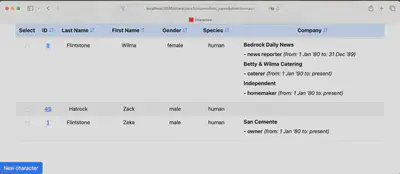
Add Partial Match Filter
Single Field Filter
Let’s make a little form to filter accept values to match:
# app/views/characters/_form_match_filter.html.erb
<%= form_with url: characters_path, method: :get,
data: { controller: "characters-filter", turbo_action: 'replace' } do |form| %>
<%= form.text_field(
field_name,
placeholder: placeholder,
value: params[field_name],
class: "form-control form-control-sm",
autocomplete: "off",
data: { action: "input->characters-filter#filter" }) %>
<% end %>
To make a form that accepts values as they are typed we need a stimulus controller that matches the name characters-filter with a function called filter.
To make this javascript controller (& integrate it into our project use:.
bin/rails g stimulus characters_filter
Now we can add the following code:
// app/javascript/controllers/characters_filter_controller.js
import { Controller } from "@hotwired/stimulus";
export default class extends Controller {
filter() {
clearTimeout(this.timeout);
this.timeout = setTimeout(() => {
this.element.requestSubmit();
}, 200);
}
}
let’s add partial filter to the company filter using:
<%= render "form_match_filter", field_name: :company_filter, placeholder: "partial name" %>
within the table header - thus it would look like:
# app/views/characters/index.html.erb
<%= turbo_refreshes_with method: :morph, scroll: :preserve %>
<p style="color: green"><%= notice %></p>
<% content_for :title, "Characters" %>
<h1>Characters</h1>
<div id="characters" class="container text-center">
<table class="table table-striped table-hover">
<thead class="sticky-top">
<tr class="table-primary">
<th scope="col" class="align-top">
ID <%= sort_link(column: "characters.id") %>
</th>
<th scope="col" class="align-top">
Last Name <%= sort_link(column: "last_name") %></th>
<th scope="col" class="align-top">
First Name <%= sort_link(column: "first_name") %>
</th>
<th scope="col" class="align-top">
Gender <%= sort_link(column: "gender") %>
</th>
<th scope="col" class="align-top">
Species <%= sort_link(column: 'species.species_name') %>
</th>
<th scope="col" class="align-top">
Company <%= sort_link(column: 'companies.company_name') %>
<%= render "form_match_filter", field_name: :company_filter, placeholder: "partial name" %>
</th>
</tr>
</thead>
...
Now if we test it, we should see the following:

let’s update the rails controller to use the filter using:
company_filter = params[:company_filter]
query = if company_filter.present?
query.joins(character_jobs: { job: :company }).where('companies.company_name ilike ?', "%#{company_filter}%")
else
query
end
now the controller should look like:
# app/controllers/characters_controller.rb
class CharactersController < ApplicationController
before_action :set_character, only: %i[ show edit update destroy ]
# GET /characters or /characters.json
def index
# query with sorting
column = params[:column]
direction = params[:direction]
# base query
query = Character
.includes(:species)
.includes(character_jobs: { job: :company })
# add sort if direction is given
query = if direction == 'none' || column.blank?
query.order('characters.id')
else
query.order("#{column} #{direction}")
end
# partial match filters
@company_filter = params[:company_filter]
query = if @company_filter.present?
query.joins(character_jobs: { job: :company }).where('companies.company_name ilike ?', "%#{@company_filter}%")
else
query
end
# execute query
@characters = query.all
end
...
Now if we test (enter part of a company name and hit
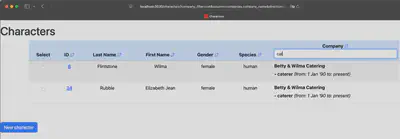
Assuming this work let’s merge.
git add .
git commit -m "added simple company filter"
Allow Multiple Filters with Sorting
This simple filter is a bit limited since currently we can only filter one column and we can’t sort and filter at the same.
Let’s add the params to our form(s) using:
<!-- Preserve existing sort parameters -->
<% if params[:column].present? %>
<%= form.hidden_field :column, value: params[:column] %>
<% end %>
<% if params[:direction].present? %>
<%= form.hidden_field :direction, value: params[:direction] %>
<% end %>
<!-- add all other filter parameters except the current one -->
<% params.each do |key, value| %>
<% next if key == field_name || key == 'column' || key == 'direction' || key == 'controller' || key == 'action' %>
<%= form.hidden_field key, value: value %>
<% end %>
now the _form_match_filter.html.erb should look like:
# app/views/characters/_form_match_filter.html.erb
<%= form_with url: characters_path, method: :get,
data: { controller: "characters-filter", turbo_action: 'replace' } do |form| %>
<!-- Preserve existing sort parameters -->
<% if params[:column].present? %>
<%= form.hidden_field :column, value: params[:column] %>
<% end %>
<% if params[:direction].present? %>
<%= form.hidden_field :direction, value: params[:direction] %>
<% end %>
<!-- Include all other filter parameters except the current one -->
<% params.each do |key, value| %>
<% next if key == field_name || key == 'column' || key == 'direction' || key == 'controller' || key == 'action' %>
<%= form.hidden_field key, value: value %>
<% end %>
<%= form.text_field(
field_name,
placeholder: placeholder,
value: params[field_name],
class: "form-control form-control-sm",
autocomplete: "off",
data: { action: "input->characters-filter#filter" }) %>
<% end %>
Now update the sort_link helper:
module CharactersHelper
def sort_link(column:)
next_direction = column == params[:column] ? future_direction : 'asc'
display_arrow = params[:column] == column ? current_sort_arrow : tag.i(class: "bi bi-arrow-down-up")
link_to_params = params.permit!.to_h.merge(column: column, direction: next_direction)
link_to(
display_arrow.html_safe,
characters_path(link_to_params),
data: { turbo_action: 'replace' }
)
end
...
Now when we test we should be able to sort and filter at the same time.

Allowing Multiple Filters
Now we should be able to add this filter to other columns:
# app/views/characters/index.html.erb
<%= turbo_refreshes_with method: :morph, scroll: :preserve %>
<p style="color: green"><%= notice %></p>
<% content_for :title, "Characters" %>
<h1>Characters</h1>
<div id="characters" class="container text-center">
<table class="table table-striped table-hover">
<thead class="sticky-top">
<tr class="table-primary">
<th scope="col" class="align-top">
ID <%= sort_link(column: "characters.id") %>
</th>
<th scope="col" class="align-top">
Last Name <%= sort_link(column: "last_name") %>
<%= render "form_match_filter", field_name: :last_name_filter, placeholder: "partial last name" %>
</th>
<th scope="col" class="align-top">
First Name <%= sort_link(column: "first_name") %>
<%= render "form_match_filter", field_name: :first_name_filter, placeholder: "partial first name" %>
</th>
<th scope="col" class="align-top">
Gender <%= sort_link(column: "gender") %>
</th>
<th scope="col" class="align-top">
Species <%= sort_link(column: 'species.species_name') %>
</th>
<th scope="col" class="align-top">
Company <%= sort_link(column: 'companies.company_name') %>
<%= render "form_match_filter", field_name: :company_filter, placeholder: "partial company name" %>
</th>
</tr>
</thead>
And of course we need to update the controller:
# app/controllers/characters_controller.rb
class CharactersController < ApplicationController
before_action :set_character, only: %i[ show edit update destroy ]
def index
# query with sorting
column = params[:column]
direction = params[:direction]
# base query
query = Character
.includes(:species)
.includes(character_jobs: { job: :company })
# add sort if direction is given
query = if direction == 'none' || column.blank?
query.order('characters.id')
else
query.order("#{column} #{direction}")
end
# partial match filters
@first_name_filter = params[:first_name_filter]
@last_name_filter = params[:last_name_filter]
@company_filter = params[:company_filter]
query = query.where('characters.first_name ilike ?', "%#{@first_name_filter}%") if @first_name_filter.present?
query = query.where('characters.last_name ilike ?', "%#{@last_name_filter}%") if @last_name_filter.present?
query = if @company_filter.present?
query.joins(character_jobs: { job: :company }).where('companies.company_name ilike ?', "%#{@company_filter}%")
else
query
end
# execute query
@characters = query.all
end
Now it should look like:
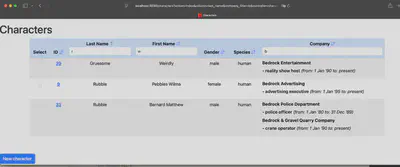
Let’s commit this change.
git add .
git commit -m "allow multipe filters and sorting"
Add Dropdown Filter
Now lets add some dropdown filters.
we can make a dropdown partial - adding the url params to the form:
# app/views/characters/_dropdown_form_filter.html.erb
<%= form_with url: characters_path, method: :get,
data: { controller: "characters-filter", turbo_action: 'replace' } do |form| %>
<!-- Preserve existing sort parameters -->
<% if params[:column].present? %>
<%= form.hidden_field :column, value: params[:column] %>
<% end %>
<% if params[:direction].present? %>
<%= form.hidden_field :direction, value: params[:direction] %>
<% end %>
<!-- Include all other filter parameters except the current one -->
<% params.each do |key, value| %>
<% next if key == field_name || key == 'column' || key == 'direction' || key == 'controller' || key == 'action' %>
<%= form.hidden_field key, value: value %>
<% end %>
<%= form.select(field_name,
options_for_select([['All', '']] + options, params[field_name]),
{},
class: "form-select form-select-sm",
data: { action: "change->characters-filter#filter" }) %>
<% end %>
Now add the dropdowns into the template:
# app/views/characters/index.html.erb
<%= turbo_refreshes_with method: :morph, scroll: :preserve %>
<p style="color: green"><%= notice %></p>
<% content_for :title, "Characters" %>
<h1>Characters</h1>
<div id="characters" class="container text-center">
<table class="table table-striped table-hover">
<thead class="sticky-top">
<tr class="table-primary">
<th scope="col" class="align-top">
ID <%= sort_link(column: "characters.id") %>
</th>
<th scope="col" class="align-top">
Last Name <%= sort_link(column: "last_name") %>
<%= render "form_match_filter", field_name: :last_name_filter, placeholder: "partial last name" %>
</th>
<th scope="col" class="align-top">
First Name <%= sort_link(column: "first_name") %>
<%= render "form_match_filter", field_name: :first_name_filter, placeholder: "partial first name" %>
</th>
<th scope="col" class="align-top">
Gender <%= sort_link(column: "gender") %>
<%= render "dropdown_form_filter", field_name: :gender_selection, options: Character.distinct.pluck(:gender).compact %>
</th>
<th scope="col" class="align-top">
Species <%= sort_link(column: 'species.species_name') %>
<%= render "dropdown_form_filter", field_name: :species_selection, options: Species.pluck(:species_name, :id) %>
</th>
<th scope="col" class="align-top">
Company <%= sort_link(column: 'companies.company_name') %>
<%= render "form_match_filter", field_name: :company_filter, placeholder: "partial company name" %>
</th>
</tr>
</thead>
And of course we need to add the new filters in the controller
# Dropdown selections
@gender_selection = params[:gender_selection]
@species_selection = params[:species_selection]
query = query.where(gender: @gender_selection) if @gender_selection.present?
query = query.where(species_id: @species_selection) if @species_selection.present?
now the characters_controller should look like:
# app/controllers/characters_controller.rb
class CharactersController < ApplicationController
before_action :set_character, only: %i[ show edit update destroy ]
def index
# query with sorting
column = params[:column]
direction = params[:direction]
# base query
query = Character
.includes(:species)
.includes(character_jobs: { job: :company })
# add sort if direction is given
query = if direction == 'none' || column.blank?
query.order('characters.id')
else
query.order("#{column} #{direction}")
end
# partial match filters
@first_name_filter = params[:first_name_filter]
@last_name_filter = params[:last_name_filter]
@company_filter = params[:company_filter]
query = query.where('characters.first_name ilike ?', "%#{@first_name_filter}%") if @first_name_filter.present?
query = query.where('characters.last_name ilike ?', "%#{@last_name_filter}%") if @last_name_filter.present?
query = if @company_filter.present?
query.joins(character_jobs: { job: :company }).where('companies.company_name ilike ?', "%#{@company_filter}%")
else
query
end
# Dropdown selections
@gender_selection = params[:gender_selection]
@species_selection = params[:species_selection]
query = query.where(gender: @gender_selection) if @gender_selection.present?
query = query.where(species_id: @species_selection) if @species_selection.present?
# execute query
@characters = query.all
end

Refactor hidden parameters
Let’s add an other partial _form_hidden_params.html.erb as now we need to add this a 3rd time:
# app/views/characters/_form_hidden_params.html.erb
<!-- Preserve existing sort parameters -->
<% if params[:column].present? %>
<%= form.hidden_field :column, value: params[:column] %>
<% end %>
<% if params[:direction].present? %>
<%= form.hidden_field :direction, value: params[:direction] %>
<% end %>
<!-- Include all other filter parameters except the current one -->
<% params.each do |key, value| %>
<% next if key == field_name || key == 'column' || key == 'direction' || key == 'controller' || key == 'action' %>
<%= form.hidden_field key, value: value %>
<% end %>
Now we can simplify the other form_partials to:
# app/views/characters/_form_match_filter.html.erb
<%= form_with url: characters_path, method: :get,
data: { controller: "characters-filter", turbo_action: 'replace' } do |form| %>
<%= render "form_hidden_params", form: form, field_name: field_name %>
<%= form.text_field(
field_name,
placeholder: placeholder,
value: params[field_name],
class: "form-control form-control-sm",
autocomplete: "off",
data: { action: "input->characters-filter#filter" }) %>
<% end %>
And
# app/views/characters/_form_dropdown_filter.html.erb
<%= form_with url: characters_path, method: :get,
data: { controller: "characters-filter", turbo_action: 'replace' } do |form| %>
<%= render "form_hidden_params", form: form, field_name: field_name %>
<%= form.select(field_name,
options_for_select([['All', '']] + options, params[field_name]),
{},
class: "form-select form-select-sm",
data: { action: "change->characters-filter#filter" }) %>
<% end %>
Everything should still look and work as before

now let’s commit:
git add .
git commit -m "refactor to unify hidden params into a shared partial"
Resources
Adding Bootstrap to an existing project
- https://www.youtube.com/watch?v=phOUsR0dm5s
- https://medium.com/@gjuliao32/installing-bootstrap-rails-7-a-step-by-step-guide-0fc4a843d94f
Bootstrap Icons
Rails Table Articles
- Table Sorting Rails 7.1 - 21 Mar 2024
- Table Filtering Rails 7.0 - 15 Oct 2021
- Table Sorting Rails 7.0 - 19 Sep 2021
- Table Sorting with Stimulus
Rails Hotwire
- Turbo Rails Intro
- Hotwiring Rails Book
- Hot Rails Tutorial - building Turbo Rails
- Rebuilding Turbo Rails - new version
- Rails Hotwire Modals
- Turbo Frame Pages in Ruby on Rails 7
- Digging into Turbo with Ruby on Rails 7
- Mastering Turbo Frames and Turbo Streams in Rails 7: Build a Journal Entry Tagging Feature
- Odin Probject - Turbo Tutorial
- Hotwire Turbo Transitions
APPENDIX
when using esbuild you should see the following two files and you should NOT see import-map files or config!
David Colby who wrote: https://www.colby.so/posts/turbo-8-refresh-sorting and https://www.colby.so/posts/filtering-tables-with-rails-and-hotwire
writes:
For reference, Procfile.dev looks like this for me on a fresh esbuild + bootstrap install:
web: env RUBY_DEBUG_OPEN=true bin/rails server
js: yarn build --watch
css: yarn watch:css
And package.json looks like this:
{
"name": "app",
"private": true,
"dependencies": {
"@hotwired/stimulus": "^3.2.2",
"@hotwired/turbo-rails": "^8.0.4",
"@popperjs/core": "^2.11.8",
"autoprefixer": "^10.4.19",
"bootstrap": "^5.3.3",
"bootstrap-icons": "^1.11.3",
"esbuild": "^0.20.2",
"nodemon": "^3.1.0",
"postcss": "^8.4.38",
"postcss-cli": "^11.0.0",
"sass": "^1.76.0"
},
"scripts": {
"build": "esbuild app/javascript/*.* --bundle --sourcemap --format=esm --outdir=app/assets/builds --public-path=/assets",
"build:css:compile": "sass ./app/assets/stylesheets/application.bootstrap.scss:./app/assets/builds/application.css --no-source-map --load-path=node_modules",
"build:css:prefix": "postcss ./app/assets/builds/application.css --use=autoprefixer --output=./app/assets/builds/application.css",
"build:css": "yarn build:css:compile && yarn build:css:prefix",
"watch:css": "nodemon --watch ./app/assets/stylesheets/ --ext scss --exec \"yarn build:css\""
},
"browserslist": [
"defaults"
]
}